 Bhutan is only less than two months away from its 3rd National Council (NC) elections. If there is one thing that has not changed since the first elections in 2008, it is the poor women participation.
Bhutan is only less than two months away from its 3rd National Council (NC) elections. If there is one thing that has not changed since the first elections in 2008, it is the poor women participation.
The number of aspiring female candidates for the NC election continues to remain dismal. A staggering 175 aspiring candidates, the highest so far, have registered, but of that only a mere eight are women.
In 2008, six female candidates contested along with 46 male. The number of female candidates dropped to four in 2013, while the number of male candidates rose to 67.
The downward trend in women participation in parliamentary elections is a cause of worry for Phuntshok Chhoden, the Executive Director of Bhutan Network for Empowering Women, BNEW.
While a host of factors are to be blamed, BNEW’s Executive Director says the deeply entrenched societal, cultural and traditional beliefs, stereotypes and norms surrounding gender roles are the main reasons why making headway in terms of women participation in elections remains a daunting task.
“We have been groomed and nurtured to be good girls and the definition of good woman is being modest, humble, gentle and not being bold and loud and out there,” Phuntshok Chhoden said.
“Also, girls have always been protected, sheltered and kept home. I think this is why girls shy away from stepping out in the public sphere.”
Poor women participation in elections is problematic in many ways. It means decision and policy making would lack women voice. Numerous research have proved that women make better laws, one that is gender sensitive and also more representative of societal needs and concerns.
“The kind of laws, both in terms of numbers and quality, which come out of the parliament or even the policies that are developed in circles where there are more women are much more of a higher quality,” Phuntshok Chhoden said.
“It is more representative of societal needs and concerns.Women being more concerned and aware, and also being mothers, wives, and having been there in society, shouldering multiple roles, they do not take up only women’s issues but take care of social issues once they are in leadership positions.”
BNEW, as a CSO dedicated towards women empowerment, does a lot has to not only encourage women participation but also to get them elected by equipping them with skills to find their voice and the leader in them.
Still, a lot needs to be done to create an enabling environment for women and the effort has to come not just from the government side but also from relevant agencies.
For the women themselves, BNEW’s Executive Director says, how the elected women leaders perform can go a long way in changing societal attitudes towards women leadership. “At the end of day, once they are elected, all eyes are on them,” she said.
“Their performances are of utmost importance to ensure that more women in the future can get elected,” added Phuntshok Chhoden.
For now, it is certain that, the National Council, like in the past, will have more male than female members. What the future has in store for the National Assembly remains to be seen.












